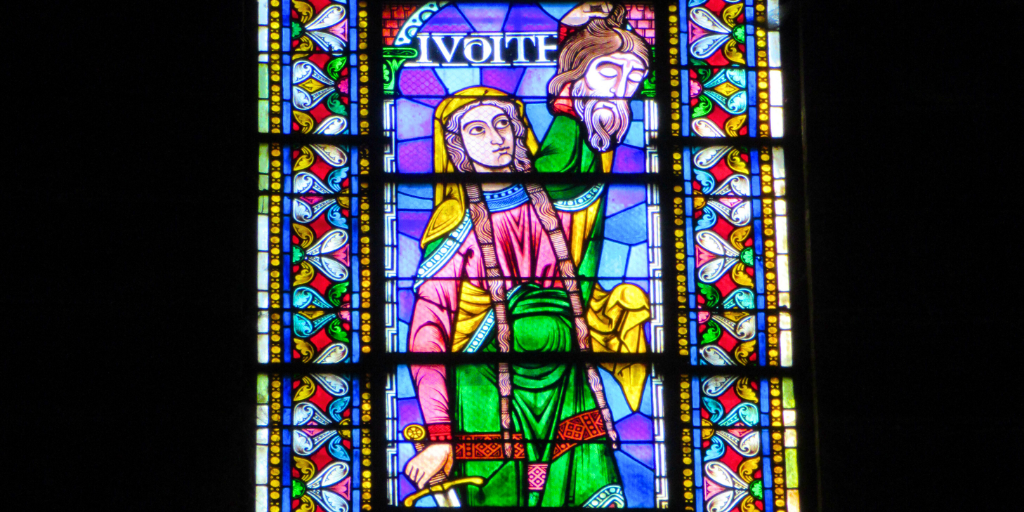
Amanda Lawrence ponders how the biblical Book of Judith exemplifies faith, surrender, obedience to God, and serenity.
Many are familiar with the scriptural story of David and Goliath, but what about Judith and Holofernes? The tale tells of a pious Jewish widow who risked everything to save her city. In return, God rewarded Judith by elevating her status to that of a noble conqueror.
Judith’s Biblical text exemplifies virtue overcoming vice. Artists magnified that moralizing subject throughout history, depicting Judith with a serene smile and her enemy’s severed head. Yet, we rarely mention Judith of Bethulia in modern times.
Judith symbolizes civic virtue and intolerance of tyranny; such critical triumphs were popular topics among painters throughout the ages. Some artists, like Cranach, portray Judith in fancy, dressed-to-kill garb; others, like Massys and Dalí, paint her nude. Caravaggio shows her humbly dress in the gruesome act while her maid looks on. While these depictions may unnerve some, they also invite us to contemplate God’s grace in the face of hopelessness.
The biblical book of Judith resonates with me because it exemplifies how faith, surrender, and obedience to God bring serenity. For that, Judith is my hero. I meditate on this whenever I visit The Museum of Fine Arts in Boston and gaze upon my favorite oil portrait, Judith with the Head of Holofernes, by Jan Massys.
A recent trip to the MFA last July made me want to sing Judith’s praises once again. As I studied the Old Testament heroine’s peaceful beauty contrasted by her oppressor’s horrific head, I thought of her total surrender and ultimate trust. Judith went all in for God, and multiple readings of her book taught me to do the same.
Here’s how!
Always have faith
With the Assyrian army upon them, the distressed Israelites cried out to the Lord for help. The God-fearing widow Judith could no longer tolerate her people’s suffering. She urged them to remain faithful throughout the harsh conditions of war while they awaited salvation.
The war-torn modern world often feels hopeless, but Judith reminds us to refocus our gaze on God and have faith, especially during these dark times!

Self-abandonment is often necessary to get results
The devout widow encouraged the Israelites to thank God for testing them as He did their ancestors. Even while her people perished, faithful Judith promised relief. She dressed in sackcloth and lay prostrate on the ground, pleading loudly to the Lord. She begged God to show the world that He protects His people by volunteering herself as the vessel used to crush her enemies.
Judith’s bravery and desire to make God’s presence known drives her story while placing Him at its center. In a world that tries desperately to mock God’s existence, there’s no better way to counter its attempts than by offering ourselves up like Judith and allowing His presence to consume us.
Obedience is essential for strength
After her thoughtful prayer, Judith prepared to go into battle. With her maid by her side, fearless Judith went to war. Her beauty and charm disarmed General Holofernes, who fell prey to her deceitful lips. By her fourth day at his camp, she won his confidence, leading Holofernes to overindulge in alcohol.
Judith remained inside his tent once his servants withdrew. Alone with a drunk Holofernes, Judith asked God for strength before beheading the general with his sword. Judith and her maid return home victorious, holding up the gruesome head of General Holofernes. Her people believed firmly in God after that.
Throughout her life, Judith gave glory to God. In return, the Lord protected her and allowed hers to be the hand that struck down her enemy. The results of Judith’s fearless proclamations should inspire us to do the same, even when it’s scary, uncomfortable, or inconvenient.
.png?width=860&height=1075&name=20250130%20ALawrence%202%20(1).png)
Serenity is in God
The Assyrian soldiers, overcome with fear, scattered and fled in all directions upon discovering the headless Holofernes. Their leader was gone. Nebuchadnezzar’s forces were defeated soon after. Israelite warriors emerged triumphant, honoring Judith all the while. The Jewish heroine gave glory to God.
Judith became renowned throughout the land. Her life remained full and tranquil until her death at 105. Throughout the book, she embraces the challenges before her, knowing God made her for more. Judith offered herself to God, and in return, He blessed her with deliverance and a long life.

What I like most about the Jan Massys portrait hanging in the MFA, aside from inspiring my son to draw Judith, is the peaceful smile that saturates her face. It reveals the bliss that accompanies complete self-abandonment to God. Judith’s serenity encourages hope and reminds us that God’s promises are never forgotten. Meanwhile, the grisly image of her victim’s head shows God’s ultimate conquest of evil. If that isn’t something to grin about, then what is?
Share your thoughts with the Catholic Mom community! You'll find the comment box below the author's bio and list of recommended articles.
Copyright 2025 Amanda Lawrence
Images: (bottom) copyright 2025 Gavin Santos, all rights reserved, used with permission; all others Canva
About the Author

Amanda Lawrence
Amanda Lawrence is a writer, mother, orator, and librarian. In her spare time, she’s an intelligent idiot who can’t stop screwing up. Praise Jesus for those tender moments when He’s like, “Oh, no, honey. Bless your heart. Aren’t you cute?” Before God swoops in. For the sake of His sorrowful Passion, have mercy on us and on the whole world!


.png?width=1806&height=731&name=CatholicMom_hcfm_logo1_pos_871c_2728c%20(002).png)
Comments